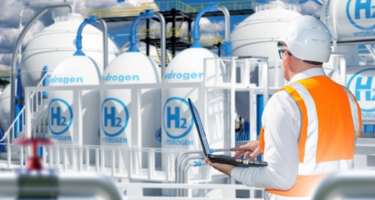 Add My Company
Add My Company

JCE, known for its expertise in hazardous environments, offers advanced control solutions for hydrogen applications. With a deep understanding of hydrogen's properties and risks, JCE provides state-of-the-art technology and comprehensive safety measures to ensure the efficient operation of hydrogen facilities. This article delves into the key aspects of control equipment in hydrogen environments, focusing on their functions, safety features, and the critical differences from equipment used in other gas environments like methane.
Introduction
In the realm of renewable energy, hydrogen production stands out due to its potential to provide clean and sustainable energy. Ensuring the safety and efficiency of hydrogen production facilities is paramount, and control equipment plays a crucial role in achieving this. Control equipment in a hydrogen environment refers to the systems and devices used to monitor, regulate, and manage hydrogen-related processes and operations. These components are essential for safe and efficient hydrogen handling across various applications.
Key Aspects of Control Equipment in Hydrogen Environments
Electrical control systems, including Programmable Logic Controllers (PLCs) and other electronic devices, are specifically designed for use in hydrogen atmospheres. These systems automate and control various processes related to hydrogen production, storage, and utilisation. PLCs play a central role in overseeing the entire hydrogen production process, ensuring optimal operation, continuously monitoring critical safety parameters such as hydrogen levels, pressure, temperature, and initiating automatic shutdown procedures when safety parameters exceed predefined limits. JCE’s advanced PLC systems are designed to meet the stringent requirements of hydrogen environments, ensuring reliable and safe operation.
Leak detection systems are essential for monitoring hydrogen environments for any leaks. Given that hydrogen is colourless, odourless, and tasteless, human detection is unreliable. These systems typically include sensors to detect hydrogen leaks and other potential hazards, alarms to quickly alert operators to potential safety issues, and automatic shutdown mechanisms to isolate affected areas and prevent escalation.
Ventilation systems are crucial to prevent the accumulation of hydrogen in enclosed spaces. These systems often include non-sparking fans made of materials like aluminium or plastic to minimise ignition risks and proper airflow design to ensure efficient dissipation of any leaked hydrogen. With JCE’s expertise, customised ventilation solutions are provided to meet the specific needs of hydrogen environments, ensuring safety and compliance.
Monitoring instruments measure and display critical parameters such as pressure, temperature, and flow rates in hydrogen systems. Key instruments include pressure sensors to monitor system pressure and detect abnormalities, temperature transducers and thermocouples for tracking temperature variations, and flow meters to ensure adequate flow rates, particularly in electrolysis processes.
Automated safety shutdown systems are designed to quickly halt operations in response to detected leaks or other safety concerns. These systems are integrated with PLCs to provide rapid response and immediate shutdown of operations to prevent accidents, while also coordinating with other safety systems to ensure comprehensive emergency response.
All electrical equipment used in hydrogen environments must be specially rated for hazardous areas, adhering to standards such as ATEX Standards in Europe, Class 1, Division 1 or 2, Group B of the National Electric Code (NEC) and IECEx. These ratings ensure that the equipment is safe for use in explosive atmospheres. JCE specialises in providing ATEX & IECEx-certified electrical components, ensuring compliance and safety in hazardous hydrogen environments.
Bonding and grounding systems are vital for preventing static electricity buildup, which could potentially ignite hydrogen. Proper grounding techniques are employed to ensure safety.
Testing equipment is used to assess the strength, leakage, and deformation of hydrogen-containing components and systems. Regular testing ensures the integrity and safety of the hydrogen infrastructure.
Key Safety Features of Control Equipment
In the high-stakes arena of hydrogen production, robust safety measures are non-negotiable. At the forefront of these measures are advanced leak detection systems. Employing acoustic and infrared monitoring, these systems are vital for identifying unignited hydrogen leaks before they can escalate into dangerous situations. Crucially, they are integrated with alarms and automatic shutdown mechanisms to provide immediate response capabilities.
Ventilation is another cornerstone of hydrogen safety, preventing the build-up of hydrogen gas that could lead to explosive conditions. Ensuring optimal airflow in storage and operational areas is essential to mitigate this risk.
The use of equipment and materials specifically rated for explosive environments further minimises ignition risks. This includes deploying non-sparking tools, intrinsically safe electrical components, and anti-static materials. Control valves and pressure sensors play a critical role in maintaining safe pressure levels, effectively regulating hydrogen flow and detecting any pressure abnormalities that might indicate a potential hazard.
Worker safety is equally paramount. Proper personal protective equipment (PPE) is a must, encompassing flame-retardant clothing, face shields, insulated gloves for handling cryogenic hydrogen, and anti-static safety shoes.
Routine inspections and meticulous maintenance of equipment and pipelines are necessary to preemptively identify and rectify potential issues before they can develop into serious problems. Personnel training is essential, ensuring that all staff are well-versed in the safe handling of hydrogen, emergency response procedures, and the proper use of PPE. Clear, well-documented operating procedures must be established and rigorously followed.
Automated systems are indispensable for their ability to swiftly shut down operations in the event of detected leaks or other safety concerns, thereby preventing accidents and minimising damage.
Certification and Compliance
In the specialised field of hydrogen environments, securing the right certifications is crucial for ensuring safety and reliability. Electrical equipment must meet stringent standards for use in hazardous areas, typically adhering to ATEX standards in Europe, Class 1, Division 1 or 2, Group B of the National Electric Code (NEC) or IECEx. These certifications are essential for guaranteeing that the equipment can safely operate in potentially explosive atmospheres.
Gas safety certification is another critical requirement, ensuring that all equipment meets rigorous safety standards for handling hydrogen gas. This is complemented by CE and UKCA markings, which signify compliance with essential safety and performance standards in Europe and the UK.
For components dealing with pressurised hydrogen, it is imperative to secure certification to relevant pressure equipment standards. Given the high flammability of hydrogen, equipment often requires additional certification for explosion protection to mitigate the risks of ignition.
As control systems become increasingly interconnected, cybersecurity measures must also be certified to protect the integrity and security of hydrogen control systems. Ensuring robust cybersecurity is essential to safeguard against potential threats that could compromise the safety and functionality of these systems.
JCE’s products and services exemplify adherence to all these critical certifications. Our comprehensive compliance ensures that every piece of equipment they provide meets the highest standards of safety and reliability, making them a trusted leader in hydrogen environment solutions.
Conclusion
Control equipment in hydrogen environments is pivotal in ensuring the safe and efficient operation of hydrogen production facilities. By understanding the unique properties of hydrogen and implementing robust control systems, we can harness the potential of hydrogen as a clean and sustainable energy source while mitigating associated risks. Adherence to safety standards, regular maintenance, and comprehensive training are essential components of a safe hydrogen production environment. With JCE’s extensive expertise and proven track record, you can be assured of the highest standards of safety and efficiency in your hydrogen operations.
For more information on The Role of Control Equipment in Hydrogen Environments talk to JCE Group (UK) Ltd
